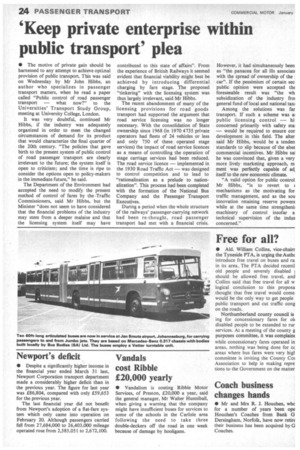'Keep private enterprise within public transport' plea
Page 26

If you've noticed an error in this article please click here to report it so we can fix it.
• The motive of private gain should be harnessed to any attempt to achieve optimal provision of public transport. This was said on Wednesday by Mr John Hibbs, an author who specializes in passenger transport matters, when he read a paper called "Public control of road passenger transport — what now?" to the Universities' Transport Study Group, meeting at University College, London.
It was very doubtful, continued Mr Hibbs, if the industry was adequately organized in order to meet the changed circumstances of demand for its product that would characterize the final quarter of the 20th century. "The policies that gave birth to the present system of public control of road passenger transport are clearly irrelevant to the future; the system itself is open to criticism; and the time is ripe to consider the options open to policy-makers in the immediate future," he said.
The Department of the Environment had accepted the need to modify. the present method of control of fares by the -Traffic Commissioners, said Mr Hibbs, but the Minister "does not seem to have considered that the financial problems of the industry may stem from a deeper malaise and that the licensing system itself may have contributed to this state of affairs". From the experience of British Railways it seemed evident that financial viability might best be achieved by introducing differential charging by fare stage. The proposed "tinkering" with the licensing system was thus largely irrelevant, said Mr Hibbs.
The recent abandonment of many of the licensing provisions for road goods transport had supported the argument that road service licensing was no longer necessary. With the consolidation of State ownership since 1968 (in 1970 4735 private operators had fleets of 24 vehicles or less and only 750 of these operated stage services) the impact of road service licences as a means of controlling the operation of stage carriage services had been reduced. The road service licence — implemented in the 1930 Road Traffic Act — was designed to control competition and to lead to "rationalization as a prelude to nationalization". This process had been completed with the formation of the National Bus Company and the Passenger Transport Executives.
During a period when the whole structure of the railways' passenger-carrying network had been re-thought, road passenger transport had met with a financial crisis. However, it had simultaneously been as "the panacea for all ills associat( with the spread of ownership of the: car". If the pessimism of certain sec public opinion were accepted tht foreseeable result was "the wh subsidization of the industry frol general fund of local and national tax; Among the solutions was far transport. If such a scheme was a, public licensing control -hi concerned primarily with safety sta; — would be required to ensure cor development in this field. The alter said Mr Hibbs, would be a tenden standards to slip because of the abse commercial incentives. Mr Hibbs sai he was convinced that, given a very more lively marketing approach, m ment was perfectly capable of ad itself to the new economic climate.
"A valid option for public control Mr Hibbs, "is to revert to i mechanisms as the motivating for traffic management, and as the sou innovation retaining reserve powers while at the same time strengtheni; machinery of control insofar a technical supervision of the indus concerned."




























































































